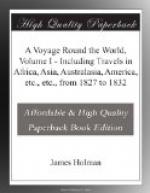A statement of the annual export of timber from Tombo, since the commencement in 1816, will shew with what rapid strides the trade has increased.
In 1816 716 logs. 1817 7,087 do. 1818 1,341 do. 1819 2,251 do. 1820 6,271 do. 1821 4,454 do. 1822 1,429 do. 1823 4,593 do. 1824 10,093 do. 1825 22,206 do. 1826 24,456 do.
There is a mud bar across the river about one mile and a half below Tombo; and as the depth here is not more than 14 feet at high water, vessels ought not to load more than 13 feet before they drop below.
Tuesday, Sept. 25th.—Heavy rain in the night, but a fine warm day. Soon after noon I left Tombo, and visited Bance Island. The only objects of interest that presented themselves were the remains of an old slave factory, and a burial ground. The road to the latter place was by a path through a lime and orange plantation, which grew so luxuriantly that it quite obstructed our way, and we were compelled to have a black pioneer, who went before us with a sword to cut down the thorny branches. In this remote and lonely place I found the following epitaph on a tombstone, which appeared to me so curious that I caused it to be transcribed.
Here lies The Residue of The Honourable Sea Captain, GEORGE ANDREW HIORT, Born in Denmark, the 6th of September, 1746, Married January 8th, 1766, to the virtuous Lady Mary Catherine Schive, who, extremely sorrowful, with two good-natured Daughters, deplores the too early Death of this now eternally-blessed Person.
Died on the Coast of Guinea, the 15th
October, 1783. His Body reposes
here, waiting for a glorious Resurrection,
whilst his Soul is in the
hands of GOD, where no pain can reach.
In this place we discovered a tombstone of the date of 1680, but unfortunately the inscription was illegible.
We made an excursion to the island of Tasso before dinner, and returned to Bance Island where we passed the night. On approaching Tasso, we saw a large alligator, which Mr. McCormack fired at, but apparently without any effect. It is a well-known fact that the scales of these creatures will turn a bullet. They abound in the river, and are very fearless and ravenous. Some of the men belonging to the timber rafts, who incautiously trusted themselves in the water, have been on several occasions seized by the alligators and carried off, sometimes escaping with the loss of a leg or an arm; at other times, when the people on the rafts happened to sit at the sides, with their feet hanging over, the alligators have been known to seize them by their legs and drag them into the water. They have been taken of the enormous length of 18 feet.
Wednesday, Sept. 26th.—The night being very fine, we got up at half-past two, and left Bance Island to return to Sierra Leone, where we arrived in less than four hours, pulling the whole way, having a very fine boat belonging to Mr. McCormack, with a crew of able bodied blacks.




